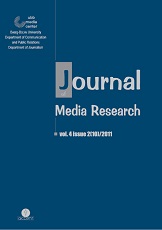Internal Communication – Essential Component of Crisis Communication
Internal Communication – Essential Component of Crisis Communication
Author(s): George DavidSubject(s): Social Sciences
Published by: Accent Publisher
Keywords: organizational crisis; crisis communication; internal communication; internal publics; crisis communication plan
Summary/Abstract: In “normal”, day-to-day circumstances, internal communication is vital to the proper functioning of an organization. For the effective management of crisis situations its role is all the more so. Indeed, the lack of accurate, adequate, timely and fluent information during a crisis dramatically affects the trust people have in their own organization, thus endangering the commitment they should show in cooperating to crisis resolution. Meanwhile, the lack of accurate information could determine organization members to be open to rumors – one of the enormous threats in times of crisis – as well as to circulating defeatist declarations. This is how a crisis situation affecting one or more organizations becomes dangerous not only due to the apparent consequences it produces (victims, breakdowns, damages, losses, serious threats to the organizational structure, dramatic changes of the organizational purposes, goals and strategies etc.), not only due to its media impact, but also because of the negative influence to their own personnel’s morale, efficiency and capability of intervention, as a result of inadequate communication. At the same time, the limited concern to accurately, adequately and timely inform own organizational members adulterates their quality as image multipliers: instead of taking action as carriers of positive image to organizational stakeholders, they will – to a greater or lesser extent – make their worries, doubts, fears and suspicions, as well as rumors coming from collateral sources public. All of these factors affect organizational credibility, and credibility is exactly what constitutes one of the most important assets to be used in crisis management. Organization members thus ought to preferably find out about a crisis from internal sources. However, because of the unpredictable progress of a crisis, chances are that mass media will gain primacy to internal information. Even then, the organizational management must be aware of the need to rapidly, accurately and satisfactorily communicate with own members and to apply the plan previously prepared in this respect.
Journal: Journal of Media Research - Revista de Studii Media
- Issue Year: 4/2011
- Issue No: 10
- Page Range: 72-81
- Page Count: 10
- Language: English
- Content File-PDF

